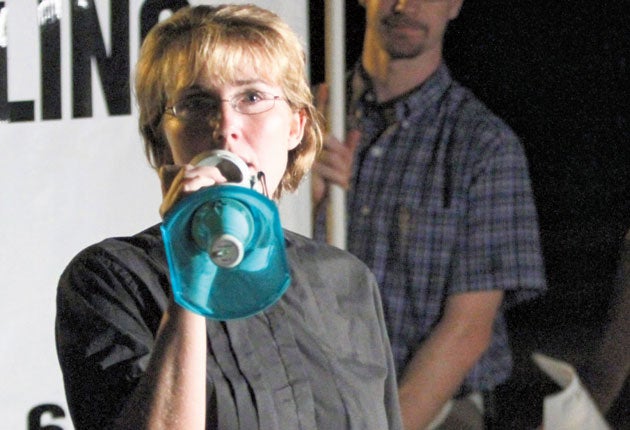Your support helps us to tell the story
From reproductive rights to climate change to Big Tech, The Independent is on the ground when the story is developing. Whether it's investigating the financials of Elon Musk's pro-Trump PAC or producing our latest documentary, 'The A Word', which shines a light on the American women fighting for reproductive rights, we know how important it is to parse out the facts from the messaging.
At such a critical moment in US history, we need reporters on the ground. Your donation allows us to keep sending journalists to speak to both sides of the story.
The Independent is trusted by Americans across the entire political spectrum. And unlike many other quality news outlets, we choose not to lock Americans out of our reporting and analysis with paywalls. We believe quality journalism should be available to everyone, paid for by those who can afford it.
Your support makes all the difference.Her last meal was fried chicken and green peas, washed down with a can of Dr Pepper.
Her last outfit was a blue prison uniform and a pair of flip-flops. And her final words, uttered in the moments before they strapped her down to administer the lethal injection, were: "I'm very sorry."
Teresa Lewis, a 41 year-old former drug addict with an IQ that puts her on the verge of being mentally disabled, became the first woman to be executed in the United States for five years when she was put to death at Greensville Correctional Center in Jarratt, Virginia.
Supporters of Lewis, who was convicted of hiring two hit-men to kill her husband, Julian, and his son, Charles, in 2002, watched silently through one-way glass as she was tied down with leather straps securing her legs, wrists and chest, before intravenous lines were inserted into each arm.
Also looking on, in the other familiar ritual of American capital punishment, were friends and relatives of Lewis's victims, who were killed as part of a macabre plot to secure a life insurance payout. They saw her feet twitch slightly as the lethal injection was administered and she slipped into death.
Of the more than 1,200 people who have been executed since the US Supreme Court voted to reinstate the death penalty in 1976, only 11 have been woman – a statistic which, together with the circumstances of Lewis's original murder conviction, helped turn her case into a global cause célèbre. More than 7,300 appeals were lodged with the Governor of Virginia, Robert McDonnell, calling for him to stop her killing, including one by the thriller writer John Grisham.
Even the President of Iran, Mahmoud Ahmadinejad, got in on the act. He used a speech in New York this week to argue that the case typified Western double standards: Americans expressed outrage at the stoning of woman in Islamic countries, he argued, yet sanctioned the lethal injection of a mentally challenged woman in their own backyard.
At her original trial, the prosecution portrayed Lewis as an appalling criminal mastermind who hoped to make $250,000 from the death of her stepson Charles, an Army reservist who had a standard military life insurance policy which named Lewis's husband, Julian, as its chief beneficiary.
The court heard how Lewis, a serial adultress, met two young men, Matthew Shallenberger and Rodney Fuller, at a branch of Walmart. She began a sexual relationship with both men, before plotting with them to kill both Charles and Julian – using shotguns she had bought for them.
Although Lewis later admitted her guilt, her alleged role as mastermind seems at odds with her IQ, which at somewhere between 70 and 72 puts her on the verge of being mentally disabled. Adding to the apparent discrepancies in her death sentence was the fact that Shallenberger and Fuller, who were also convicted, were sentenced to mere life imprisonment.
"Tonight the death machine exterminated the beautiful childlike and loving spirit of Teresa Lewis," said her lawyer, James Rocap, shortly after her death was announced.
Right Or Wrong?
John Grisham, Lawyer and Novelist
'Why did the triggermen get life without parole while Lewis received a death sentence? ... It had little to do with fairness. It depended more upon the assignment of judge and prosecutor, the location of the crime, the quality of the defence counsel ... and other such factors.'
James Rocap, Teresa Lewis's lawyer
'She laughed, she sang, she prayed. I think she had accepted what was going to happen a long time ago, and she was very peaceful ... Tonight the death machine exterminated the childlike and loving spirit of Teresa Lewis.'
Kathy Clifton, Lewis's stepdaughter
'Once it's all done, I'll be able to move on. I will know for a fact she will never be able to harm anyone again. She claims to be a Christian, and I don't know how strong her faith is, but I have faith in my Lord. He says not to kill, but He also says to obey the law of the land. If she was truly a spiritual person, she would be happy to go along with any sentence.'

Join our commenting forum
Join thought-provoking conversations, follow other Independent readers and see their replies
Comments